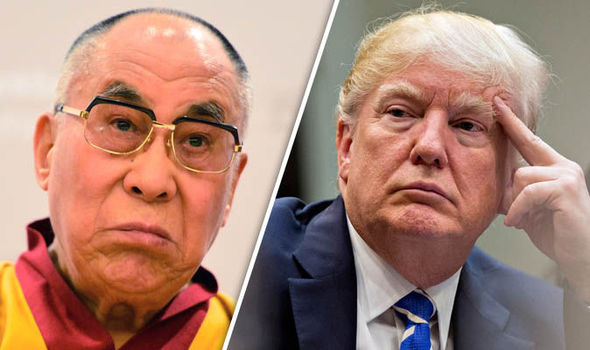
Desperate Dragon: China warns Indian media not to play the “Tibet card”
Virendra Pandit
New Delhi: A jittery China, annoyed at the world encircling it in a pincer movement, on Wednesday warned the Indian media from playing the “Tibet card”, claiming it as an “internal affair”.
The year 2020 has seen China’s global reputation and standing plummeted to nadir after the COVID-19 outbreak, its failure to redraw the Sino-Indian border along the Line of Actual Control (LAC) in Eastern Ladakh, despite bloody conflicts, exposure of how Beijing has pauperized smaller countries in debt-traps, and the emerging four-nation ‘Asian NATO’ comprising the US, Japan, Australia, and India.
A flummoxed Beijing is also peeved at detailed media coverage of its various failures, particularly in India which it sees as a monkey unwilling to disembark from its back.
The Dragon’s desperation is now manifesting as the world hurtles from a gloomy 2020 to an uncertain 2021.
In a statement issued in New Delhi on Wednesday evening, the Chinese Embassy said that it is in the fundamental interests of China and India, as two neighboring countries and emerging economies to enhance political mutual trust, properly manage differences and strive to return China-India relations to the track of healthy and stable development.
“We hope some Indian media take an objective and fair stance on issues concerning China’s sovereignty and territorial integrity, grasp the highly sensitive nature of Xizang (Tibet)-related issues, look at Xizang’s economic and social progress objectively, do more to help China-India bilateral ties move forward instead of advocating playing Tibet card to meddle in China’s internal affairs,” the embassy’s spokesman said.
The US has also sold new arms worth billions of dollars to Taiwan and taken exception to human rights violations in the Uighur Muslim-dominated eastern Chinese province of Xinjiang. An annoyed China recently warned the US not to meddle with issues like Taiwan and Tibet.
But the screws are being tightened all around China.
In Dharmashala, India, the Tibetan Parliament-in-Exile Speaker Pema Jungney thanked the outgoing US President Donald Trump for signing a new Tibet Policy on Sunday. The Tibetan Policy and Support Act of 2020 aims to modify and re-authorize various programs and provisions related to Tibet. It reaffirms the rights of Tibetans to choose a successor to the Dalai Lama and calls for establishing an American consulate in Tibet.
He said, “This Act officially endorses that recognition of the reincarnation of the Dalai Lama is the sole authority of the great 14th Dalai Lama, the Tibetan Buddhist leaders and the Tibetan people with no interference from the Chinese government (People’s Republic of China)”.
This Act also recognizes the importance of the Tibetan Plateau and the threat climate change poses on Tibet. Over the years, the presidents of the United States of America have consistently supported the Tibet cause and we are immensely thankful for your indefatigable support in taking strong measures against China, a government that is economically the most powerful, yet having the record of the worst human rights violations, he said.
The media, particularly in India, carried this statement in detail, thus adding to China’s desperation.
It’s India embassy said the US Act on Tibet interferes in China’s internal affairs and violates the fundamental principles of international laws and basic norms governing international ties. “China firmly opposes any country, organization, or individual supporting the anti-China separatist activities of the Tibetan independence forces in any form and under any pretext.”
Recently, outgoing US President Donald Trump had signed into law a bill that reaffirms the right of Tibetans to choose a successor to the Dalai Lama and calls for establishing an American consulate in Tibet, failing which Washington will not allow Beijing to open any new consulate in America. This prompted China to warn that the act will seriously disrupt and hurt bilateral relations.
The Tibetan Policy and Support Act of 2020 modifies and re-authorizes various programs and provisions related to Tibet.
Trump signed the Act as part of the massive $2.3 trillion packages for the year-end bill to provide long-delayed coronavirus relief and fund the federal government.












